A syntax–lexicon trade-off in language production
Author(s)
Rezaii, Neguine; Mahowald, Kyle; Ryskin, Rachel; Dickerson, Bradford; Gibson, Edward
DownloadPublished version (1.425Mb)
Publisher with Creative Commons License
Publisher with Creative Commons License
Creative Commons Attribution
Terms of use
Metadata
Show full item recordAbstract
<jats:p>
Spoken language production involves selecting and assembling words and syntactic structures to convey one’s message. Here we probe this process by analyzing natural language productions of individuals with primary progressive aphasia (PPA) and healthy individuals. Based on prior neuropsychological observations, we hypothesize that patients who have difficulty producing complex syntax might choose semantically richer words to make their meaning clear, whereas patients with lexicosemantic deficits may choose more complex syntax. To evaluate this hypothesis, we first introduce a frequency-based method for characterizing the syntactic complexity of naturally produced utterances. We then show that lexical and syntactic complexity, as measured by their frequencies, are negatively correlated in a large (
<jats:italic>n</jats:italic>
= 79) PPA population. We then show that this syntax–lexicon trade-off is also present in the utterances of healthy speakers (
<jats:italic>n</jats:italic>
= 99) taking part in a picture description task, suggesting that it may be a general property of the process by which humans turn thoughts into speech.
</jats:p>
Date issued
2022Department
Massachusetts Institute of Technology. Department of Brain and Cognitive SciencesJournal
Proceedings of the National Academy of Sciences of the United States of America
Publisher
Proceedings of the National Academy of Sciences
Citation
Rezaii, Neguine, Mahowald, Kyle, Ryskin, Rachel, Dickerson, Bradford and Gibson, Edward. 2022. "A syntax–lexicon trade-off in language production." Proceedings of the National Academy of Sciences of the United States of America, 119 (25).
Version: Final published version